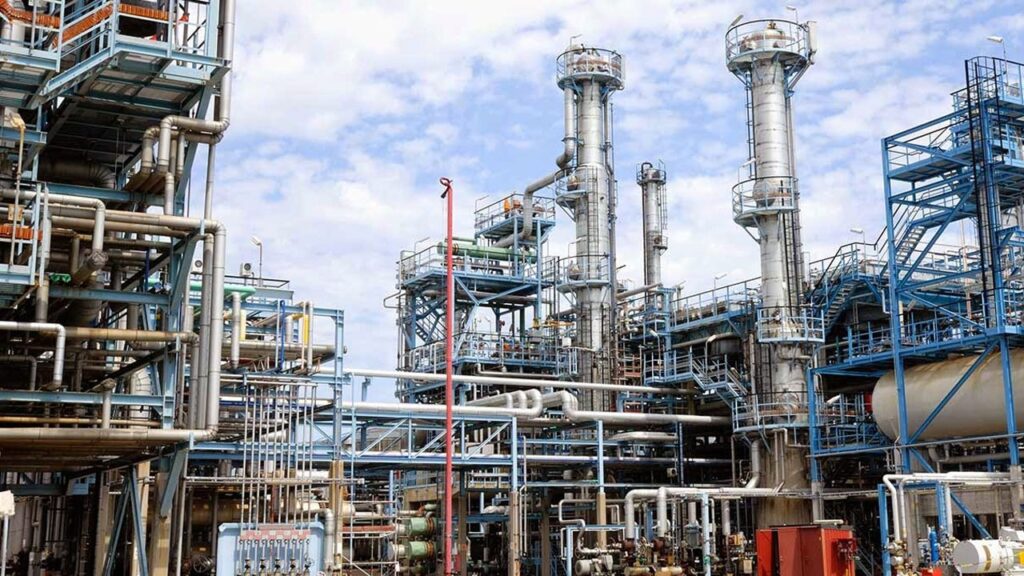The Port Harcourt refinery operated by the Nigerian National Petroleum Company Limited (NNPCL) has temporarily ceased operations, with only its non-petroleum unit, the Crude Distillation Unit (CDU), remaining functional.
The Crude Distillation Unit (CDU) produces naphtha, kerosene, and diesel but cannot generate the component required for Premium Motor Spirit (PMS), commonly known as petrol, top sources at the refinery revealed to SaharaReporters on Saturday.
SaharaReporters has been tracking activities at the Port Harcourt refinery since Tuesday, following claims by the NNPCL that the refinery was operational and distributing Premium Motor Spirit (PMS) to the public.

It Exclusively revealed that only the old section of the refinery was functional and blending “Crack C5 with the Naphtha” to distribute it as PMS. Staff had cautioned that this could have an “effect” on vehicles.
Top sources clarified on Wednesday that the NNPCL resorted to blending Crack C5 with Naphtha from the primary units because the secondary units of the refinery are not yet operational. While blending is a standard industry practice, they explained that “the blended products are reformate. Gasoline is produced from the secondary units of the process plant. These secondary units are yet to be commissioned.”
Providing an update on Saturday, a senior official informed SaharaReporters that only the Crude Distillation Unit (CDU) is functional at the moment, producing naphtha, kerosene, and diesel.
“The Crude Distillation Unit (CDU) is still running but the operation of the depot is shut down at the moment. The CDU produces naphtha, diesel, and kerosene but cannot produce the component for the production of PMS,” the source disclosed.
They added, “All these products cannot serve the masses as the production of these products are in small quantities even if the plant runs at 100% throughput. The processing plant of 150,000bpd capacity will commence operations in 2026; that is if money is made readily available to meet the timelines because at the moment the project has exceeded $2 billion.”
On Tuesday, SaharaReporters revealed that the NNPCL had confirmed its exclusive reports that only the old Port Harcourt Refinery in Rivers State is operational and that it is not trucking out PMS but rather blended gasoline.
READ ALSO: ‘We Must End Insecurity Before It Ends Us’– Peter Obi Warns Amid Rising Terror Attacks in Nigeria
In a statement, the NNPCL’s Chief Corporate Communications Officer, Olufemi Soneye, acknowledged that the old refinery is currently running at 70% of its installed capacity, producing Straight-Run Gasoline (Naphtha), which is blended into 1.4 million liters of Premium Motor Spirit (PMS), commonly referred to as petrol, daily.
“The Board and Management of the Nigerian National Petroleum Company Limited (NNPC Ltd.) express heartfelt appreciation to Nigerians for their support and excitement over the safe and successful restart of the 60,000 barrels-per-day Old Port Harcourt Refinery.
“This achievement marks a significant step forward after years of operational challenges and underperformance.
“We are, however, aware of unfounded claims by certain individuals suggesting that the refinery is not producing products.
“For clarity, the Old Port Harcourt Refinery is currently operating at 70% of its installed capacity, with plans to ramp up to 90%. The refinery is producing the following daily outputs.”
“Straight-Run Gasoline (Naphtha): Blended into 1.4 million liters of Premium Motor Spirit (PMS or petrol); Kerosene: 900,000 liters; Automotive Gas Oil (AGO or Diesel): 1.5 million liters; Low Pour Fuel Oil (LPFO): 2.1 million liters; Liquefied Petroleum Gas (LPG): Additional volumes.”
Soneye had added, “It is worth noting that the refinery incorporates crack C5, a blending component from our sister company, Indorama Petrochemicals (formerly Eleme Petrochemicals), to produce gasoline that meets required specifications.
“Blending is a standard practice in refineries globally, as no single unit can produce gasoline that fully complies with any country’s standards without such processes.
“Additionally, we have made substantial progress on the new Port Harcourt Refinery, which will begin operations soon without prior announcements.”
Follow Parallel Facts on WhatsApp Channel:https://whatsapp.com/channel/0029VaCQSAoHgZWiDjR3Kn2E









Leave a Reply